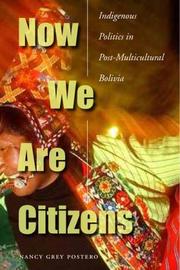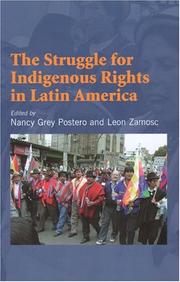| Listing 1 - 5 of 5 |
Sort by
|
Book
ISBN: 0520967305 0520294033 9780520967304 9780520294035 9780520294035 Year: 2017 Publisher: University of California Press
Abstract | Keywords | Export | Availability | Bookmark
 Loading...
Loading...Choose an application
- Reference Manager
- EndNote
- RefWorks (Direct export to RefWorks)
"In 2005, Bolivians elected their first indigenous president, Evo Morales. Ushering in a new "democratic cultural revolution," Morales promised to overturn neoliberalism and inaugurate a new decolonized society. In this crucial new book, Nancy Postero examines the successes and failures in the ten years since Morales's election. While the Morales government has made many changes that have positively benefited Bolivia's majority indigenous population, it has consolidated power and reinforced extractivist development models. In the process, indigeneity has been transformed from a site of emancipatory politics to a site of liberal nation-state building. By carefully tracing the political origins and practices of decolonization among activists, government administrators, and ordinary citizens, Postero makes an important contribution to our understanding of the meaning and impact of Bolivia's indigenous state."--Provided by publisher.
Indigenous peoples --- Multiculturalism --- Neoliberalism --- Government relations --- Political aspects --- Morales Ayma, Evo, --- Political activity --- Bolivia --- Politics and government --- Ethnic relations --- Political activity. --- Neo-liberalism --- Liberalism --- Cultural diversity policy --- Cultural pluralism --- Cultural pluralism policy --- Ethnic diversity policy --- Social policy --- Anti-racism --- Ethnicity --- Cultural fusion --- Aboriginal peoples --- Aborigines --- Adivasis --- Indigenous populations --- Native peoples --- Native races --- Ethnology --- Government policy --- Morales Ayma, Juan Evo, --- Ayma, Juan Evo Morales, --- Ayma, Evo Morales, --- Morales, Evo, --- Morales Aima, Evo, --- Aima, Evo Morales, --- Alto Perú --- Bolivija --- Bulibiya --- Bulibiya Mamallaqta --- Estado Plurinacional de Bolivia --- Plurinational State of Bolivia --- Republic of Bolivia --- República de Bolivia --- Upper Peru --- Wuliwya --- Wuliwya Suya --- Peru-Bolivian Confederation --- autonomy. --- bolivia. --- bolivian people. --- bolivian politics. --- economic liberation. --- economy. --- global. --- illustrated. --- indigenous cultures. --- indigenous nationalism. --- indigenous people. --- international. --- liberalism. --- maps. --- national identity. --- nationalism. --- political performance. --- political. --- politics. --- race issues. --- racial identity. --- racial issues. --- racism. --- spectacle. --- worldwide. --- Indigenous peoples - Bolivia - Government relations - 21st century --- Multiculturalism - Political aspects - Bolivia - 21st century --- Neoliberalism - Bolivia - 21st century --- Morales Ayma, Evo, - 1959- - Political activity --- Bolivia - Politics and government - 21st century --- Bolivia - Ethnic relations - Political aspects - 21st century --- Morales Ayma, Evo, - 1959 --- -Bolivia

ISBN: 9780804755191 9780804755207 Year: 2007 Publisher: Stanford; Calif. Stanford University Press
Abstract | Keywords | Export | Availability | Bookmark
 Loading...
Loading...Choose an application
- Reference Manager
- EndNote
- RefWorks (Direct export to RefWorks)
Internal politics --- Bolivia --- Guarani Indians --- Multiculturalism --- Neoliberalism --- #SBIB:324H50 --- #SBIB:328H32 --- Indians of South America --- Neo-liberalism --- Liberalism --- Cultural diversity policy --- Cultural pluralism --- Cultural pluralism policy --- Ethnic diversity policy --- Social policy --- Anti-racism --- Ethnicity --- Cultural fusion --- Government relations --- Politics and government --- Political aspects --- Politieke participatie en legitimiteit (referenda, directe democratie, publieke opinie...) --- Instellingen en beleid: Midden en Latijns-Amerika --- Government policy --- Santa Cruz (Bolivia : Department) --- Santa Cruz (Bolivia : Dept.) --- Santa Cruz de la Sierra (Bolivia : Department) --- Ethnic relations --- Political aspects. --- Politics and government.
Book
ISBN: 0804786445 9780804786447 9780804784528 0804784523 9780804784535 0804784531 Year: 2013 Publisher: Stanford, California
Abstract | Keywords | Export | Availability | Bookmark
 Loading...
Loading...Choose an application
- Reference Manager
- EndNote
- RefWorks (Direct export to RefWorks)
In the 1980's and 1990's, neoliberal forms of governance largely dominated Latin American political and social life. Neoliberalism, Interrupted examines the recent and diverse proliferation of responses to neoliberalism's hegemony. In so doing, this vanguard collection of case studies undermines the conventional dichotomies used to understand transformation in this region, such as neoliberalism vs. socialism, right vs. left, indigenous vs. mestizo, and national vs. transnational. Deploying both ethnographic research and more synthetic reflections on meaning, consequence, and possibility, the essays focus on the ways in which a range of unresolved contradictions interconnect various projects for change and resistance to change in Latin America. Useful to students and scholars across disciplines, this groundbreaking volume reorients how sociopolitical change has been understood and practiced in Latin America. It also carries important lessons for other parts of the world with similar histories and structural conditions.
Neoliberalism --- Social change --- Latin America --- Politics and government --- Social conditions --- Economic policy. --- Economic policy --- Neoliberalism - Latin America --- Social change - Latin America --- Latin America - Politics and government - 1980 --- -Latin America - Social conditions - 1982 --- -Latin America - Economic policy
Book
ISBN: 9789978225240 9978225242 Year: 2005 Publisher: Quito : Abya-Yala,
Abstract | Keywords | Export | Availability | Bookmark
 Loading...
Loading...Choose an application
- Reference Manager
- EndNote
- RefWorks (Direct export to RefWorks)
Human rights --- Indians --- Civil rights. --- Government relations. --- Politics and government. --- Latin America --- Race relations. --- Social policy.

ISBN: 1845190637 Year: 2004 Publisher: Sussex academic press
Abstract | Keywords | Export | Availability | Bookmark
 Loading...
Loading...Choose an application
- Reference Manager
- EndNote
- RefWorks (Direct export to RefWorks)
| Listing 1 - 5 of 5 |
Sort by
|

 Search
Search Feedback
Feedback About UniCat
About UniCat  Help
Help News
News